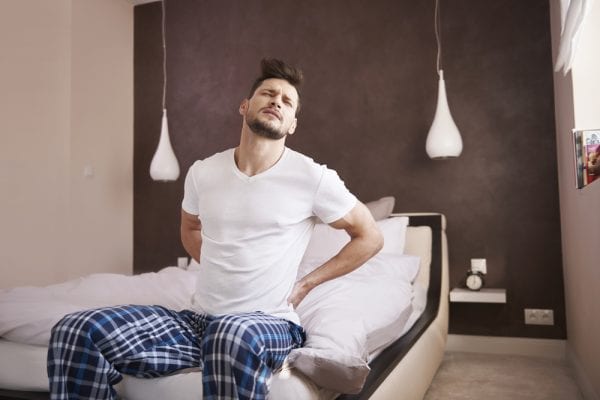
Understanding the Causes of Joint Pain and Stiffness in the Morning
Many people find themselves waking up stiff and sore every morning and not really understanding why. This is one of the most common symptoms of rheumatoid arthritis,1,2,3 and it can really get in the way of a person’s daily activities.
However, morning stiffness causes also include osteoarthritis, especially after people with this condition physically exert themselves or have long periods of no activity.4
Here is some information about stiff joints in the morning, what causes it, and how to ease morning stiffness caused by arthritis. Fortunately, there are exercises, stretches, and measures that can be taken to make morning stiffness arthritis more manageable and less of a burden.
What Stiff Joints in the Morning Mean
When the joints are sore in the morning, it may mean that a type of arthritis is present in the joints. Most commonly, the type of arthritis that causes stiff joints in the morning is rheumatoid arthritis.1,2,3 But this stiffness often lingers past the early morning hours and affects a person’s quality of life later in the day as well. Stiff morning joints can occur in many different parts of the body, including the fingers, hands, wrists, knees, ankles, shoulders, hips, feet, and jaw. Morning stiffness could also be mean that a person has symptoms of fibromyalgia.5
Morning Stiffness Causes
One common cause of joint pain and stiffness in the morning include a lack of activity during the hours of sleep. This cannot be fully avoided since the body needs an adequate amount of sleep each night. Some studies have shown that the circadian rhythms of the body can also cause bodily cells to become inflamed at certain stages of sleep, and this can lead to morning stiffness arthritis.6,7 Another one of the possible morning stiffness causes is low levels of cortisol released at night during sleep.8
What to Do If You’re Waking Up Stiff and Sore Every Morning: How to Ease Morning Stiffness Arthritis Symptoms
Fortunately, there are some ways to counteract the cycle of waking up stiff and sore every morning.9 It’s a good idea to take prescribed arthritis medication right after waking up so it can begin to take effect immediately to ease morning stiffness. It is also recommended to do exercises in the morning, especially range-of-motion exercises that get the knees, hips, hands, and feet moving again. Also, try taking a warm bath or shower first thing in the morning to soothe sore joints, or use a heating pad before getting up to move around. Arthritis pain relief creams, like JointFlex, can help ease morning stiffness arthritis by deeply penetrating the skin to deliver immediate and long-lasting relief to the site of stiffness.
Sleep can be beneficial for arthritis sufferers pain management.10 At night, it is advised to sleep in a position that supports the joints most affected by arthritis and on a comfortable mattress. This may include propping the knees or hands up on a pillow for extra support. A warm sleeping environment is best for people who experience stiff joints in the morning. It may also help to use adaptive devices to assist with morning hygiene routines and chores until the fingers, hands, and other joint regions loosen up later in the day.
REFERENCES for STIFF JOINTS in the MORNING
1. Kontzias, A. (2017 July). Rheumatoid arthritis (RA). The Merck Manual: Consumer Version. Retrieved October 21, 2018 from https://www.merckmanuals.com/home/bone,-joint,-and-muscle-disorders/joint-disorders/rheumatoid-arthritis-ra.
2. Scott, J. T. (1960). Morning Stiffness in Rheumatoid Arthritis. Annals of Rheumatic Diseases, 19, 361-368. Retrieved October 18, 2018 from https://ard.bmj.com/content/annrheumdis/19/4/361.full.pdf.
3. Freeman, G. Inflammation and stiffness: The hallmarks of arthritis. Arthritis Foundation. Retrieved October 21, 2018 from https://www.arthritis.org/about-arthritis/understanding-arthritis/arthritis-swelling-and-stiffness.php.
4. Osteoarthritis. Arthritis Foundation. Retrieved October 21, 2018 from https://www.arthritis.org/about-arthritis/types/osteoarthritis/.
5. Fibromyalgia. National Institute of Arthritis and Musculoskeletal and Skin Diseases. Retrieved October 21, 2018 from https://www.niams.nih.gov/health-topics/fibromyalgia.
6. Straub, R. H. & Cutolo, M. (2007 February). Circadian rhythms in rheumatoid arthritis: Implications for pathophysiology and therapeutic management. Arthritis & Rheumatism, 56, 399-408. Retrieved October 21, 2018 from https://onlinelibrary.wiley.com/doi/pdf/10.1002/art.22368.
7. Gibbs, J. E. & Ray, D. W. (2013 February 21). The role of the circadian clock in rheumatoid arthritis. Arthritis Research & Therapy, 15. Retrieved October 21, 2018 from https://arthritis-research.biomedcentral.com/track/pdf/10.1186/ar4146.
8. Imrich, R., Vlcek, M., Kerlik, J., Vogeser, M., Kirchhoff, F., Penesova, A., Radikova, Z., Lukac, J. & Rovensky, J. (2012 February 29). Adrenal function in rheumatoid arthritis: a correlation with disease activity. Arthritis Research & Therapy, 14. Retrieved October 21, 2018 from https://arthritis-research.biomedcentral.com/articles/10.1186/ar3628.
9. Chu, R. 10 tips to overcome morning stiffness. National Fibromyalgia & Chronic Pain Association. Retrieved October 21, 2018 from https://www.fmcpaware.org/fundraising/176-movement-therapies/907-10-tips-to-overcome-morning-stiffness.html.
10. DeVries, C. (2017 April 10). 9 ways you can sleep better with osteoarthritis. Veritas Health. Retrieved October 21, 2018 from https://www.arthritis-health.com/blog/9-ways-you-can-sleep-better-osteoarthritis.
